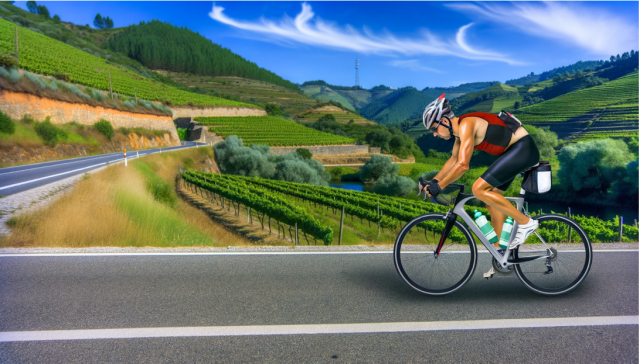Endurance cycling demands more than physical strength – it requires a well-balanced nutrition plan to sustain energy levels, maintain hydration, and promote recovery.
Choosing the right fuel for your body is essential for optimal performance, whether conquering steep hills or enjoying long stretches during your ride.
Carbohydrates, proteins, vitamins, and proper hydration strategies are key components that can make the difference between a successful ride and hitting the proverbial wall.
By focusing on these elements, cyclists can improve their endurance and performance while speeding up recovery post-ride.
This guide explores the most effective nutritional strategies for long-distance cycling, covering everything from carbohydrate intake and protein for muscle repair to hydration techniques and essential vitamins for performance.
Following these tips will ensure you're properly fueled and hydrated for any ride, be it a short commute or a more demanding route, namely those on offer in the most appealing bike rides in Europe, plenty of which can be found in the Iberian Peninsula, in the shape of Portugal bike tours.
Why Carbohydrates Are Essential for Endurance Cycling
Carbohydrates are the primary fuel source for endurance activities like long-distance cycling; during extended rides, the body burns through glycogen stores quickly, so replenishing them is essential to avoid fatigue.
Cyclists should aim to consume between 60 and 90 grams of carbohydrates per hour during long rides, depending on intensity; foods like energy gels, bananas, rice cakes, or carbohydrate-rich drinks are easy to consume on the go and help sustain energy levels.
In addition to in-ride fueling, a carbohydrate-rich meal 2 to 3 hours before your ride is crucial – this might include oats, pasta, or whole-grain bread, which provide a steady release of energy as you cycle.
The Role of Proteins in Muscle Repair During Long Rides
Protein is vital for muscle repair and recovery during and after long rides; endurance cycling breaks down muscle fibers, and consuming enough protein helps repair them, reducing soreness and recovery time.
Lean meats, eggs, dairy products, or plant-based alternatives like tofu and legumes are excellent protein sources.
For optimal recovery, consume 15 to 25 grams of protein, combined with carbohydrates, within 30 minutes post-ride to restore glycogen stores.
Protein shakes or bars are convenient options to kickstart recovery while you're still cooling down.
Hydration Strategies for Long-distance Cycling
Hydration is equally important as nutrition in long-distance cycling: Dehydration can lead to decreased performance, cramps, and even heat-related illnesses.
Cyclists should aim to drink around 500ml of fluids per hour, and it's a good idea to monitor hydration by checking urine color – lighter tones indicate better hydration.
For rides longer than 90 minutes, supplementing water with electrolytes helps replace lost minerals like sodium and potassium, critical for muscle function and preventing cramps; electrolyte drinks or salt tablets are effective options.
Essential Vitamins and Minerals for Maximum Cycling Performance
While carbohydrates and protein are often the focus, vitamins and minerals are equally crucial – cyclists need adequate amounts of vitamins, such as B vitamins, for energy production, and minerals like calcium, magnesium, and iron to support muscle function and oxygen transport.
Eating various fruits, vegetables, nuts, and whole grains ensures you get these vital micronutrients; in some cases, supplements can help fill gaps, but a balanced diet is typically sufficient.
Additional Cycling Nutrition Tips
1. Pre-Ride Nutrition
Eating a balanced meal rich in carbohydrates and protein about 2 to 3 hours before your ride ensures your glycogen stores are topped off; examples include oatmeal with fruit or a turkey sandwich.
2. In-Ride Snacks
On longer rides, it's essential to fuel consistently – carbohydrate-rich snacks, such as energy bars, dried fruit, or sports gels, are practical and portable options.
Experimenting with different foods during training is essential to find what works best.
3. Post-Ride Recovery
A post-ride meal should include carbohydrates and protein to replenish glycogen and repair muscles – chocolate milk, protein shakes, or a balanced meal with lean protein and whole grains work well.
In Short
Following these nutritional guidelines can improve your stamina and recovery, ensuring a more enjoyable and successful experience on long-distance cycling tours.
To maintain your energy and perform at your best while taking on challenging terrains or exploring scenic routes on bike tours across Portugal, it's essential to prioritize proper nutrition and hydration.






